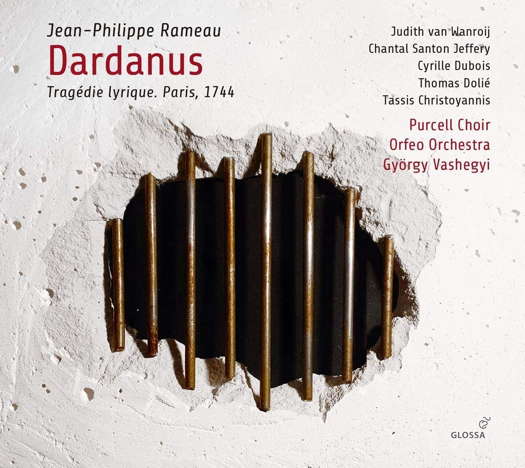- Hossein Dehlavi
- Philharmonia
- Worcester Cathedral
- Angelin Preljocaj
- John Poole
- fioriture
- Michael Oliver
- Edward Said

One of Rameau's Greatest Works
The opera 'Dardanus' impresses GERALD FENECH
'György Vashegyi paces his forces with meticulous mastery, and his thorough knowledge of the score enables him to bring to the listener all the felicitous nuances of this imaginative music.'
Jean-Philippe Rameau was, together with Jean-Baptiste Lully, one of the two most important opera composers during the golden age of the French baroque. Dardanus, an opera in a prologue and five acts to a libretto by Charles-Antoine Leclerc de La Bruere, was first performed at the Paris Opera on 19 November 1739, to a mixed reception. The reason was not the music but the weakness of the libretto, and this spurred both composer and writer to rework the piece for an eventual 1744 revival. Indeed, they completely revised the last three acts but it was only in 1760, when Dardanus was staged again, that it won the acclaim as one of Rameau's greatest works. This version under review is the 1744 work referred to above.
The original story is loosely based on Dardanus, the son of Zeus and Electra. Dardanus is at war with King Teucer, who has promised King Antenor the hand of his daughter Iphise in wedlock. Dardanus and Iphise meet secretly through the magical powers of Ismenor, and they immediately fall in love. As the story unfolds, Teucer's kingdom is being attacked by a monster. Dardanus fights the beast away, thus saving the life of Antenor who is attempting unsuccessfully to kill it. Teucer and Dardanus make peace, and the opera ends with the two lovers happily married.
Dardanus appeared at a time when the quarrel between the rival clans of Rameau and Lully was on the point of boiling over. Rameau's stage music had been controversial since its debut in 1733, when the traditionalists accused him of destroying the French operatic style created by Lully under King Louis XIV in the late seventeenth century, yet despite this hostility, Dardanus was not the outright failure for which the Lullists had hoped for. After the premiere it ran for twenty-six performances, which was not a great success, true, but at least the Paris Opera still kept faith with the composer by offering him other commissions for new works.
Listen — Rameau: Lieux funestes, où tout respire (Dardanus Act IV)
(CD3 track 1, 0:56-1:43) ℗ 2021 note 1 music gmbh :
After Rameau's death in 1764, the opera languished in the doldrums of musical history for nearly two centuries, during which performances were sparse indeed. Only in the last three decades has the piece gained some kind of recognition that it really deserves. This is hard to see why, as the work contains some truly beautiful melodies that flow like honey on the ear - a heroine torn between love and duty - a considerable slice of magical elements and some really well drawn out characters. No wonder Rameau's score is rich in instrumental colour, daring harmonies and orchestral brilliance.
Listen — Rameau: Prelude (Dardanus Act II)
(CD2 track 1, 0:21-0:57) ℗ 2021 note 1 music gmbh :
György Vashegyi paces his forces with meticulous mastery, and his thorough knowledge of the score enables him to bring to the listener all the felicitous nuances of this imaginative music. Singers and players respond with performances brimming with immense passion and technical prowess.
Listen — Rameau: Mânes plaintifs, tristes victimes (Dardanus Act I)
(CD1 track 25, 2:36-3:30) ℗ 2021 note 1 music gmbh :
A lusciously presented set, complemented by a superb booklet full of important information about the composer and his stage-works. A must for all baroque music lovers, but those with different tastes need not hesitate to invest.
Copyright © 13 April 2021
Gerald Fenech,
Gzira, Malta

CD INFORMATION - JEAN-PHILIPPE RAMEAU: DARDANUS




